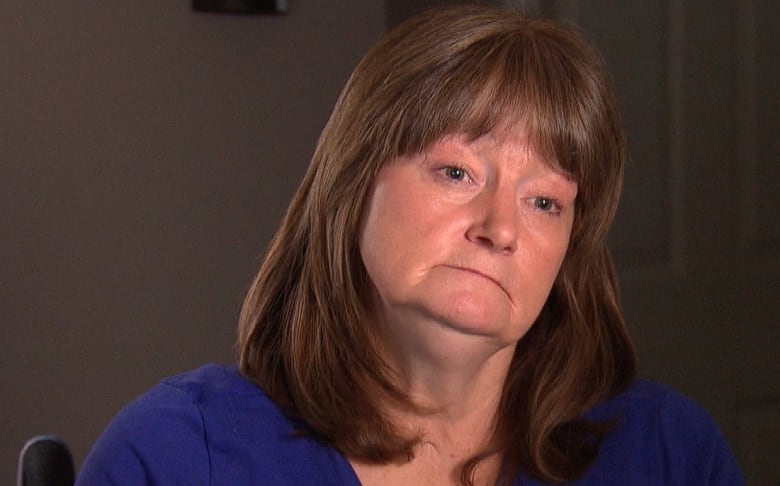'I can't live like this anymore': B.C. woman requiring home support hasn't had bath in weeks
Researcher says national home-care strategy needed to fix patchwork system in crisis
A quadriplegic woman in Surrey, B.C., who hasn't been given a bath in more than a month says her home-support provider simply ignored her complaints that the service left her feeling hungry, disgusting and depressed.
Lana Turner, 55, moved from Campbell River on Vancouver Island in December to be closer to her 22-year-old son. But he works long days in construction and is unable to help much with her care.
She says the drop in the level of home-support service between Campbell River and Surrey was a source of humiliation.
"Sometimes I just eat once a day because the workers are so rushed," she said after contacting Go Public for help. "I have to choose between being fed or getting my brief changed."

Experts and advocacy groups say complaints about home-support services are rampant across B.C. as well as the rest of the country.
University of British Columbia researcher Joanie Sims-Gould has interviewed those who receive care as well as those who provide it and says Canada has a national crisis on its hands.
The fundamental problem, she says, is the quality of care provided across the country, including within each province, is a patchwork.
"What you receive is often based more on where you live than on what you need."
That was certainly the experience Turner described before Go Public got involved and her service improved.
"In Campbell River, workers came four times a day and the last visit was at 9:30 at night," she said. "The visits were longer, at better times, and they took me out for a proper bath twice a week.
"In Surrey, they give me a sponge bath out of a little bowl ... and tell me to go to bed at 6 p.m."
When the case manager from Fraser Health Authority met with her to assess her needs, Turner says she was told she could never have a bath because her house wasn't properly equipped, nor was any other facility in her community.
At times, I want to give up, and say, 'I can't live like this anymore.' It's really tough.- Lana Turner, 55, of Surrey, B.C.
Instead, she says, the case manager scheduled sponge baths and suggested she "use dry shampoo."
"I just feel ... kind of disgusting," Turner said. "Because I'm smelling. It's hard to go out of the house. It's hard to do things when you're not clean."
She says she was also told the latest she could receive a caregiver visit would be 6 p.m. each day because her neighbourhood is dangerous. That meant 6 p.m. was her bedtime because that's when a support worker would change her into pyjamas and put her to bed.
Unable to socialize or go to evening events, Turner told Go Public she was becoming increasingly depressed.
"At times, I want to give up, and say, 'I can't live like this anymore.' It's really tough."
Niece had no luck
She contacted her outspoken niece, Gwen O'Mahony, a former NDP MLA, to advocate on her behalf.
But O'Mahony says when she asked the case manager whether her aunt's care could be improved, the answer was no.
"I just don't understand how a manager can be OK with this and how it seems normalized," O'Mahony said.
"And to get this wall — that there is no negotiating, there's no way around it — it's frustrating. It just flies in the face of what we are supposed to be doing for people under our care."

Jane Dyson, executive director of Disability Alliance of BC, says her office "constantly" hears from people fighting for more home care and support.
"It's always a battle between the service provider and how much time people need," she said.
"It's not acceptable for a grown adult to be told to get ready for bed at 6 p.m. because no one can help her. How can she live a full life? It's demeaning."
Two-tiered system
Marcy Cohen, a researcher with the Integrated Care Advocacy Group, says home care is a "two-tiered system" in Canada, because people who can afford better care opt out of the public system.
"Most people seeking [public] services are low income," Cohen said. "They're people who are least able to defend themselves."
A report Cohen co-authored with the BC Health Coalition calls on the province's Health Ministry to improve home-support staffing levels.
"The B.C. government has a policy that people should be living at home as long as possible," Cohen said. "At the same time, we're pushing people out of hospitals. So home support needs to be properly funded. The province needs to walk the talk."
- Been wronged? Contact Erica and the Go Public team
Go Public repeatedly requested an interview with B.C. Health Minister Terry Lake to discuss Turner's case and home-support service in the province.
After several days, spokeswoman Lori Cascaden said the minister wasn't available.

Researcher Joanie Sims-Gould says the way federal health transfers are distributed contributes to the uneven delivery of home-support services.
The provinces each receive their share of the money then divvy it up between their health authorities, which each then decide how to spend it.
But aside from money, what's needed, Sims-Gould says, is a national home-care strategy.
"In Canada, we think we have a national health-care system," she said. "And what we really have is a national hospital system. Under the Canada Health Act, there's no provision for home and community care."
She says Canadians need a consistent, uniform set of services they can rely on.
Changes made after Go Public calls
When Go Public began investigating Turner's case, one of the first places it called was Surrey RCMP to ask about the health authority's alleged claim that Turner's neighbourhood is too dangerous to send a lone worker after 6 p.m.
In an email, Cpl. Scotty Schumann said: "I would not be willing to label any neighbourhood in Surrey as high crime," and crime rates "have been declining year over year in Surrey."
The health authority also increased the amount of time workers spend with Turner, so they will be able to both feed and change her during an appointment.
"When concerns are raised with us ... we work very hard to be able to accommodate them," Juma said when asked about Turner's claim she called over and over and left messages that weren't returned.
Everybody will have a story about a parent, an aunt, a sibling, who the system is failing. It's inevitable, unless something changes.- University of British Columbia researcher Joanie Sims-Gould
As for arranging a bath for Turner, Juma said the health authority is "confident we'll find a solution to be able to provide a bath for her in the community."
Turner is pleased with the new arrangements, but says she shouldn't have had to fight so hard.
"They want people to stay at home," she said, "but they don't want to give them what they need."
Joanie Sims-Gould says the crisis can't be solved on a case-by-case basis and predicts that without a well-funded national home-care strategy, it will only get worse.
"Everybody will have a story about a parent, an aunt, a sibling, who the system is failing," she said. "It's inevitable, unless something changes."
Submit your story ideas
Go Public is an investigative news segment on CBC-TV, radio and the web.
We tell your stories and hold the powers that be accountable.
We want to hear from people across the country with stories they want to make public.
Submit your story ideas at Go Public.
Follow @CBCGoPublic on Twitter.
With files from James Roberts


